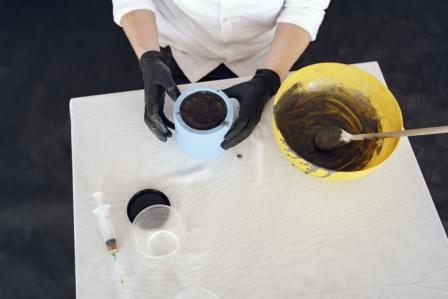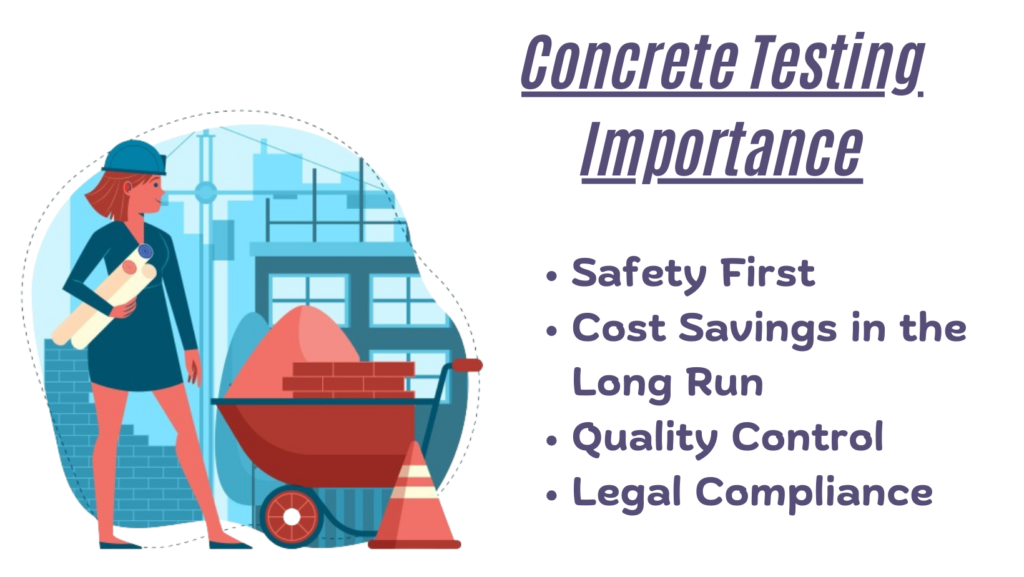Concrete testing is a crucial aspect of construction and civil engineering, ensuring that the material meets the required specifications for strength, durability, and safety. Understanding the costs associated with concrete testing can help you budget effectively and avoid unexpected expenses. In this comprehensive guide, we’ll explore the various factors that influence concrete testing costs, the typical price range, and tips for managing these costs without compromising quality.
Understanding Concrete Testing
Concrete testing encompasses a range of methods used to assess the properties and quality of concrete. These tests are essential for verifying that the concrete meets the necessary standards for its intended use. Common types of concrete testing include compression tests, slump tests, air content tests, and core tests. Each of these tests provides valuable information about the concrete’s performance and suitability for specific applications.
Factors Influencing Concrete Testing Costs
Several factors can affect the cost of concrete testing. These include the type of test being performed, the complexity of the testing process, the equipment required, and the location of the testing facility. Additionally, the size and scope of the project can impact costs, as larger projects may require more frequent testing and greater resources.
Typical Price Range for Concrete Testing
The cost of concrete testing can vary widely depending on the specific tests being conducted and the region in which the testing is performed. On average, you can expect to pay between $300 and $800 for standard compression tests. Slump tests and air content tests typically cost less, ranging from $100 to $300. More specialized tests, such as core testing, can be more expensive, with prices ranging from $500 to $1,500 or more.
Geographic Impact on Testing Costs
Regional variations can also influence the cost of concrete testing. In areas with a high cost of living or increased demand for construction services, testing costs may be higher. Conversely, in regions with lower costs and less demand, you may find more competitive pricing. It’s important to research local testing providers and compare prices to ensure you are getting the best value for your investment.
Compression Testing Cost Breakdown
Compression testing is one of the most common methods for evaluating concrete strength. The cost of compression testing includes several components, such as sample preparation, equipment usage, and labor. Sample preparation involves collecting and molding concrete samples, which are then cured before testing. The testing equipment itself, which typically includes a compression machine and related apparatus, represents another significant cost. Finally, labor costs for technicians to perform the tests and analyze the results contribute to the overall expense.
Slump Test Pricing
Slump tests are relatively simple and inexpensive, typically costing between $100 and $300 per test. This method measures the consistency and workability of fresh concrete by evaluating the slump or deformation of a concrete sample under its own weight. The test requires minimal equipment and is quick to perform, making it a cost-effective option for assessing concrete quality on-site.
Air Content Test Costs
Air content tests are used to determine the amount of air entrained in concrete, which affects its durability and resistance to freeze-thaw cycles. The cost of air content tests ranges from $100 to $300, depending on the complexity of the test and the equipment used. These tests are essential for projects in cold climates where freeze-thaw damage can be a significant concern.
Core Testing Expenses
Core testing involves extracting cylindrical samples of hardened concrete from a structure to assess its strength and integrity. This method is more invasive and costly than other tests, with prices typically ranging from $500 to $1,500 or more. The cost includes the equipment needed to drill the cores, the labor required to extract and prepare the samples, and the analysis of the test results.
Cost Comparison: Laboratory vs. On-Site Testing

The choice between laboratory and on-site testing can significantly impact the overall cost of concrete testing. Laboratory testing generally provides more controlled and accurate results but can be more expensive due to the need for specialized equipment and facilities. On-site testing, while often less costly, may be less precise but offers the advantage of immediate results. Evaluating the specific needs of your project can help you determine the most cost-effective testing approach.
Breakdown of Equipment Expenses
Equipment costs are a major component of concrete testing expenses. For example, compression testing machines, air meters, and core drilling equipment represent significant investments. In some cases, testing providers may pass these costs on to clients, particularly for specialized tests that require high-end or unique equipment.
Labor Costs in Concrete Testing
Labor costs are another key factor in concrete testing costs. Skilled technicians are required to collect samples, perform tests, and interpret results. The level of expertise needed for different tests can vary, with more complex tests requiring higher levels of skill and therefore commanding higher labor costs.
How Often Should Concrete Be Tested?
The frequency of concrete testing depends on the project’s requirements and the standards it must meet. For most construction projects, testing is conducted at various stages, including during the initial mix design, at the time of pouring, and after curing. Regular testing ensures that the concrete maintains its quality throughout the construction process, but it also adds to the overall cost.
Ways to Reduce Concrete Testing Expenses
There are several strategies for managing and reducing concrete testing costs. One approach is to consolidate testing services with a single provider, which may offer volume discounts. Additionally, scheduling tests efficiently to minimize downtime and coordinating testing with other project activities can help reduce labor and equipment costs. Finally, investing in quality materials and proper concrete handling techniques can reduce the need for extensive testing and re-testing.
Balancing Quality Assurance and Budget
While it’s important to manage costs, it’s equally crucial not to compromise on the quality of concrete testing. Skimping on testing can lead to subpar construction quality and potential safety issues. Finding a balance between cost and quality involves selecting reliable testing providers, using efficient testing methods, and adhering to industry standards.
Real-World Examples of Concrete Testing Costs
Case studies from real-world projects can provide valuable insights into concrete testing costs. For instance, a large infrastructure project might incur significant testing expenses due to the volume and frequency of tests required. On the other hand, smaller residential projects may have lower costs but still require careful budgeting to ensure compliance with quality standards.
Cost Management in Large-Scale Projects
Large-scale construction projects often face unique challenges in managing concrete testing costs. Effective cost management strategies include detailed planning, accurate forecasting of testing needs, and ongoing monitoring of expenses. Engaging experienced project managers and testing providers can help ensure that testing costs are kept under control without compromising on quality.
Compliance Costs and Standards
Regulatory requirements and industry standards play a significant role in determining the cost of concrete testing. Compliance with these standards often necessitates additional tests and documentation, which can add to the overall expense. However, adhering to these standards is essential for ensuring the safety and durability of the construction project.
Finding the Right Concrete Testing Provider:
Choosing the right provider for your concrete testing services needs is crucial for accurate results and a smooth experience. Here’s a guide to ensure you find the best partner:
- Look for Accreditation: Select laboratories accredited by recognized bodies like ASTM International. This ensures that the laboratory meets stringent quality standards and is capable of producing reliable results.
- Experience and Expertise: Seek out a provider with a team of experienced technicians who understand industry standards and can provide insightful interpretations of test results.
- Competitive Pricing: Compare quotes from multiple providers while considering the quality of their services and expertise. Remember that the cheapest option isn’t always the best, especially when it comes to something as critical as concrete testing.
- Responsiveness and Communication: Choose a provider who is responsive to your inquiries, provides clear communication, and works closely with you throughout the testing process.
Summarizing Concrete Testing Costs
In conclusion, the cost of concrete testing is influenced by a variety of factors, including the type of test, the complexity of the testing process, and regional variations. By understanding these factors and employing cost-saving strategies, you can effectively manage your testing budget while ensuring the quality and safety of your construction project.
Why is Concrete Testing So Important?
Imagine a building where the foundation isn’t strong enough or a bridge that cracks under stress. These scenarios highlight the critical role of concrete testing in ensuring structural integrity. Here’s why investing in concrete testing is crucial:

- Safety First: Testing guarantees that the concrete meets the required strength standards, preventing catastrophic failures and protecting lives.
- Cost Savings in the Long Run: Early detection of issues through testing can prevent costly repairs or replacements later. Think of it as a proactive investment to avoid future headaches.
- Quality Control: Regular testing provides valuable data for optimizing concrete mix designs, ensuring consistent quality, and minimizing material waste.
- Legal Compliance: Many building codes and regulations mandate specific concrete testing requirements, ensuring the safety and longevity of structures.
Concrete Testing Importance
Concrete testing is vital for ensuring the structural integrity and longevity of construction projects. It verifies that the concrete used meets the necessary strength and durability requirements, preventing potential failures and costly repairs. Investing in thorough and accurate testing is a critical component of any successful construction project.
FAQs
How to Choose a Testing Service?
Choosing a reliable testing service involves evaluating the provider's credentials, experience, and reputation. Look for accredited laboratories and technicians with proven expertise in concrete testing. Additionally, consider the range of tests offered and the provider's ability to deliver timely and accurate results.
Are There Any Hidden Costs?
When budgeting for concrete testing, be aware of potential hidden costs. These can include additional tests required by unforeseen issues, equipment rental fees, and expedited testing charges. To avoid surprises, discuss all potential costs with your testing provider upfront and include a contingency in your budget.
What to Do If Test Results Fail?
If concrete test results fail to meet the required standards, immediate action is necessary. This may involve re-testing, identifying and addressing the root cause of the failure, and potentially replacing the affected concrete. Working with experienced testing providers can help quickly resolve issues and minimize project delays.
How Does Testing Impact Project Timelines?
Concrete testing can impact project timelines, particularly if multiple rounds of testing are required. To mitigate delays, schedule tests in advance and coordinate with other project activities. Efficient planning and communication with your testing provider can help ensure timely results and keep your project on track.






